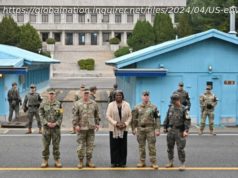The U. S. and South Korea are interested in dialogue with North Korea, but Pyongyang does not appear particularly interested.
The U. S. and South Korea are interested in dialogue with North Korea, but Pyongyang does not appear particularly interested.
North Korea has not tested a missile since its second intercontinental ballistic missile test in late July, leading Washington and Seoul to conclude that Pyongyang is showing restraint.
“We have had no missile launches or provocative act on the part of North Korea since the unanimous adoption” of the United Nations Security Council sanctions resolution earlier this month, Secretary of State Rex Tillerson said Tuesday, suggesting that a path to dialogue could open “sometime in the near future.” Officials in Seoul made similar statements, with one expressing a hope ” that this situation could set the tone for dialogue.”
“The fact that North Korea has not tested a long-range missile in a month is not necessarily equivalent to restraint. If I were to total the number and variety of missiles they have tested on an accelerated basis over the last several years, it doesn’ t look like restraint, ” Jonathan Pollack, a senior fellow at the John L. Thornton China Center and Center for East Asia Policy at the Brookings Institution, explained at a Foundation for the Defense of Democracies seminar attended Thursday by The Daily Caller News Foundation. “There may be many reasons why they’ re not testing at the moment.”
Since the UN decided to slap new sanctions on North Korea, Pyongyang has threatened to launch a salvo of four ballistic missiles into waters around Guam in a show of force for President Donald Trump, released propaganda pictures of the Korean People’s Army’s Strategic Rocket Force firing missiles at the U. S., and called for the development of new solid-fueled missiles to enhance the country’s ability to wage war against the U. S. and its regional allies, specifically South Korea and Japan.
“As long as the U. S. hostile policy and nuclear threat remains unchallenged, the DPRK will never place its self-defensive nuclear deterrence on the negotiating table or step back an inch from the path it took to bolster the national nuclear force, ” North Korean diplomat Ju Yong Chol warned at a security forum Tuesday.
“I think what Tillerson seems to be dangling is the idea that you’ ve gone a month without doing anything that we consider a ‘provocation,’ and if your ‘good behavior’ continues, we will talk to you, ” Pollack said.
“I don’ t think anyone in the administration should be under any illusions about this. There’s no reason to believe that Kim is remotely close to or considering a path that does not entail the continued qualitative and quantitative advancement of his nuclear weapons capabilities, ” Pollack continued. “What would a discussion be about? Is there a path we could imagine in which North Korea would reverse its strategic orientation? I’ m personally very skeptical that there is a path to meaningful discussion.”
“Virtually anything the North Korean regime would demand would be something that we would not and should not give, ” said Tom Malinowski, the former U. S. assistant Secretary of State for Democracy, Human Rights and Labor for the Obama administration. “So, what is the point of talks? It is absolutely essential that there be clear communication between the United States and North Korea about what are red lines are.” He also suggested that the U. S. talk to China about preparations for a possible contingency.
In his view, talks are not so much about achieving denuclearization, a difficult goal at this point; rather, a discussion with North Korea would be about preventing a dangerous miscalculation by making our position clear. However, North Korea has not yet signaled it is ready to come to the table.
Pyongyang has indicated that it would be willing to consider a testing freeze if the U. S. halted training exercises with the South, but the administration has not opted for that choice. Joint drills are currently underway in South Korea right now.
South Korea has already tried to open the lines of communication with the North, which shut down most communications channels last year. South Korea’s Vice Defense Minister Suh Choo Suk, speaking on behalf of the new government, proposed a meeting last month between the two sides in the border village of Panmunjom to discuss military and humanitarian issues.
North Korea never responded.






